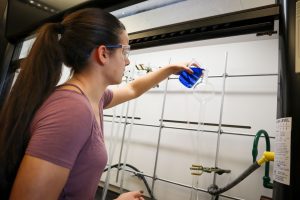GREENEVILLE – Building on its successful start, the undergraduate research program of Tusculum University’s chemistry program will expand with the recent receipt of a $52,750 grant from the Arthur Vining Davis Foundations.

Tusculum University student Alyssa Rojas synthesizes a new anti-cancer prodrug.
Tusculum’s Natural Sciences Department, which includes chemistry and other programs, kicked off a more formalized research program in the fall. The purpose was to prepare students for further studies at advanced stages of their academic and professional careers and, hopefully, make scientific breakthroughs.
The inaugural group featured three chemistry majors and two biology majors, who researched new materials for renewable energy and anti-cancer prodrugs. Students will continue to focus on those subjects with the new grant.
“These funds will foster undergraduate research that will potentially improve people’s quality of life and conserve traditional energy resources,” said Dr. Dennis Ashford, an assistant professor of chemistry at Tusculum. “This program is relatively new for us and is facilitated by the amazing laboratories at the Meen Center, which enable us to conduct cutting-edge research right here at Tusculum.”
So far, students researching the anti-cancer prodrugs have successfully synthesized and characterized five new compounds that are being tested for anti-cancer properties. In the renewable energy research project, students have successfully synthesized a new hydrogen evolution catalyst, which will be tested in the coming academic year for its ability to generate renewable fuels from sunlight.
The research program at Tusculum will utilize the two-year grant from the AVDF, a national philanthropic organization, to increase the number of students who participate during the academic year to 10. With the funds, the program will also be able to provide a stipend and housing assistance for two undergraduate students to conduct full-time research during the summer.

Tusculum University student Carter DelSorbo synthesizes a new anti-cancer prodrug.
In addition, the grant will provide the financial resources for students to present their research at regional and national conferences. It will also cover items such as supplies and external testing and analysis of compounds developed by research students.
“Both of our research topics are really exciting projects that have real-world applications and impacts,” Dr. Ashford said. “These projects could live on for years. As we make discoveries, we will publish them and inform the greater scientific community, but we will continue to refine our research, make it even better, present our findings and then take the next step to improve our materials.”
The AVDF’s 65-year mission centers around educating future generations of Americans. The organization said its Board of Trustees is excited to partner with Tusculum to build this vibrant undergraduate research program.
“In making this philanthropic investment, the board and staff of the foundations are acknowledging the significant potential demonstrated in the work that you propose to carry out,” Dr. Michael J. Murray, the organization’s president, said in a letter to Tusculum. “The staff and board are eager to follow the progress of your work and the outcomes that emerge from it.”
This is the second grant the chemistry program received to fund undergraduate research. The first was a $5,000 grant from the East Tennessee Foundation to pay for students’ supplies. Dr. Ashford said he hopes Tusculum’s success in securing these funds will lead to additional grants and more students participating in undergraduate research.


